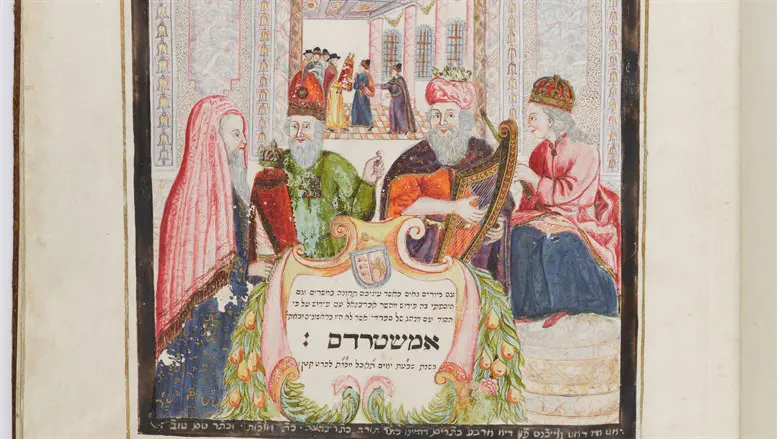
His Sephardi family is from Migdal on the Kinneret, and his wife, also now religious, grew up on Kibbutz Gvat Brenner. Besides both families, there were also relatives of relatives.
And, of course, we had five really excited and all dressed for playacting kids.
Our friend led the reading of the Haggadah, which was interspersed with songs and traditions from the kibbutz, where Pesach is a major holiday, but necessarily for the same reasons it might be to others.
Not surprisingly, there was teaching and there were questions that beyond the parameters of the four questions asked by the four sons.
One question was asked by one of the kibbutzniks: How could it be that the Haggadah says that we would still be slaves in Egypt had God not taken us out from there? Does that seem at all plausible?
Being a wise man, the Rabbi decided to punt on the question, and instead kicked it over to me. Having just finished a fascinating biography of Herzl, and having stolen a head start on the third cup of wine, I suggested that, as the Talmud would say (thank you, daf yomi), this was not a problem.
The meaning of what the Haggadah is saying is not just that what God did for us was a game changing event, but what he did for us in taking us out of Egypt was a game changing event for humanity.
Without the exodus from Egypt there would not have been the giving of the Torah, and without the giving of the Torah, the impact that we were thereby able to have on the consciousness, values and thinking of humanity would not have occurred.
There would have been no necessary catalyst for changing the mores and beliefs of an ancient world that did not believe in such fundamental notions as free will, progress, and human dignity.
Therefore, who could say that, absent the enormous change that God precipitated for humanity, and not just the Jewish People, by liberating us from Egypt, giving us the Torah and bringing us to the land that He had promised to our patriarchs, humanity might not have continued much the same as it had previously for thousands of years?
This answered engendered some approving nods, and also a small rush to refill some of the wine glasses.
As we read on, and as the delicious wine worked its magic, I decided that I was on a roll, so I offered up a question that began with the following observation: there are two and only two places where the Haggadah uses the expression, “in every generation.”
One is the chilling assertion that in every generation there are those who rise up to destroy the Jewish People…but God saves us. And in the second, in every generation one must regard himself as having been personally taken out of Egypt in order to enter the Land that God had promised to our forefathers, and ordained for the Jewish People.
What, I asked is the connection between these two statements? The Haggadah chooses its words carefully, and “in every generation” is only used in these two instances. What are we to learn from their juxtaposition?
Unlike in the first case, I did not kick the question over to the Rabbi, nor anyone else. Instead, relying on the gift of the vine, I offered my own extemporaneous suggestion.
Could it be that the two identical expressions are meant to have us somehow link the two assertions? In other words, could the act of saving us in every generation somehow be tied to a sense of experiencing the redemption of leaving Egypt and entering Eretz Yisrael?
Might the second assertion, the need to experience personally the exodus from Egypt and the entering of Eretz Yisrael, entail the sense that this is part and parcel of how God saves us? That we should feel gratitude for being preserved, and that perhaps there is a divine suggestion here, that the best way for Me to save you is for you to realize the personal significance of your leaving your own personal Egypt to come to Eretz Yisrael.
Of course, I knew that I was preaching to the choir, as it were, as we were celebrating the Seder on the Golan Heights in a community festooned with Israeli flags. And the wine was sure an inspiration.
But even now, after the fact, it does seem that there is a connection. So, I was proud to inject a Zionistic note into the discussion, to give a plug, as it were, for the redemptive power of being in Israel.
While there were no Ukrainians at our Seder, I am certain that were we privileged to have hosted some, they would have agreed wholeheartedly with my connection.
Next year in Jerusalem!
Douglas Altabef is the Chairman of the Board of Im Tirtzu and a Director of the Israel Independence Fund. He can be reached at dougaltabef@gmail.com.